An NHS funding shortfall is driving proposals to close Calderdale A&E and “transform” Calderdale and Huddersfield NHS and social care system.
At the March 2014 Calderdale Clinical Commissioning Group Governing Body Meeting, it was clear that “austerity” politics is driving the proposed closure of Calderdale A&E, and related moves to totally change the whole NHS and social care system.
In reply to a GP’s comment that the Calderdale Clinical Commissioning Group needed to explain to the public why the proposed “transformation” of Calderdale & Huddersfield NHS and social care was necessary, the Chief Officer Matt Walsh said that the “case for change” is based on the need to reduce NHS spending in line with a predicted national NHS funding shortall of £30bn by 2020 – a requirement NHS England announced last summer in its “Call to Action”.
Dr Martin De Bono, who attended the meeting as spokesperson for Calderdale and Huddersfield NHS Foundation Trust, repeated the “austerity” message:
“There’s absolutely no doubt that we believe the worst decision we could take is to do nothing! The whole system is unsustainable as it is at the moment! Change needs to happen!”
Although this assertion has more holes than a sieve, and in a BMJ Data Briefing the Kings Fund Chief Economist John Appleby dismissed it as a “politician’s syllogism”, the meeting let it pass.
Not surprising, since this is the Coalition government mantra on the NHS and maybe the CCG isn’t allowed to criticise government policy? Healthwatch certainly isn’t.
Dr De Bono’s line comes straight from Andrew Landsley, who as Secretary of State for Health claimed that the current NHS system is unsustainable and therefore has to change.
A “case for change” based on “austerity” politics doesn’t have a rational leg to stand on
Robert Reich, professor of public policy at the University of California, Berkeley and former labour secretary in the Clinton administration, is quoted in the Guardian today as saying,
“The austerity narrative is nonsense – and its dangerous nonsense. It’s sort of the Vietnamisation of the economy – [that] you’re saving the economy by killing it… if you embrace austerity and thereby reduce economic growth you actually end up potentially in a worse place than you started, with a higher ratio of public debt to GDP. At the same time you are generating huge amounts of human suffering unnecessarily. It takes a huge toll on individuals, on families and on communities.”
The claim that the current NHS system is unsustainable is code for “not having enough money to cover costs- because of political decisions”. Political decisions made without any democratic mandate – none of the changes forced through by the Health and Social Care Act 2012 were in any party election manifesto
If NHS England’s Call to Action means Calderdale CCG has to cut an extra £80m from its spending by 2020 – a figure calculated by Calderdale Council Leader Tim Swift- on top of all the other so-called efficiency savings, costs of so-called reforms, and below-inflation NHS funding increases, it could well be true that there won’t be enough money in the system to cover Calderdale NHS costs.
But this is the result of a political decision, not an economic necessity. So it is entirely open to question.
The UK is the 6th or 7th richest country in the world. Among countries of similar levels of wealth, it has one of the lowest per person spends on healthcare.
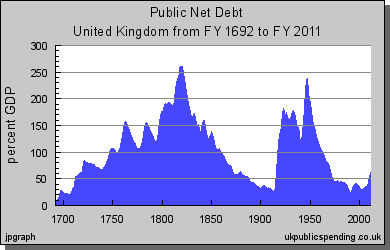 Contrary to much pro-austerity propaganda, UK government debt is not very high in historical terms.
Contrary to much pro-austerity propaganda, UK government debt is not very high in historical terms.
Britain was far more heavily indebted after WW2 when it found the political will to set up and fund the NHS.
The idea that a national economy works in the same way as a household economy is ill-informed. So household economics don’t work if you apply them to a national economy.
The best thing to do when a national economy is in recession and the government deficit is rising is not to cut public spending, but to increase it.
This is because of the multiplier effect – increasing public spending means more people are employed, earn money, pay more taxes and spend more money. So other sectors of the economy benefit and more people become better off. And pay more taxes.
The deficit goes down as more taxes come in.
Never let a good crisis go to waste
The fact that the UK government debt has increased as a result of Coalition government public spending cuts demonstrates this fact.
The decision to cut public spending, including spending on the NHS, is nothing to do with sustainability or unsustainability and everything to do with ideology and a greedy desire to make the rich richer and the rest of us poorer.
Perhaps more charitably, professor of public policy Robert Reich calls it a “terrible mistake”.
We could easily fund the NHS properly. The decision not to do this is purely a political decision.
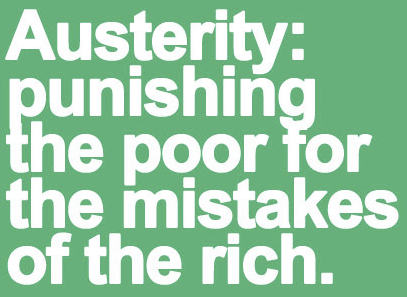 The austerity lie – or terrible mistake, if you go along with Robert Reich’s interpretation- is about never letting a good crisis go to waste.
The austerity lie – or terrible mistake, if you go along with Robert Reich’s interpretation- is about never letting a good crisis go to waste.
Big companies, with the help of government politicians whom they have bought, use
economic crises as an excuse to acquire public assets at cheap prices, and to win
contracts to run outsourced public services more cheaply than they had cost when the
public sector ran them.
The results have not pleased the House of Commons Public Accounts Committee, or the
people who use the outsourced services, or the bodies who have awarded the contracts to private outsourcing companies.
Misguided governments think that selling off publicly-owned assets, like the Royal Mail
and our schools, is a good way to reduce the government debt, and they want to privatise
public services anyway so this is a good excuse.
Big companies also use the “too big to fail argument” to get the public to bail them out
and pay off their debts, in a grand demonstration of socialism for the rich and
dispossession for the rest of us.
Naomi Klein wrote about this in Shock Doctrine. More recently, Philip Mirosski has written “Never Let a Serious Crisis Go To Waste: How Neoliberalism Survived the Financial Meltdown”. Unlike the Calderdale & Huddersfield NHS Trust’s Strategic Outline Case for transforming the NHS and social care, it’s very readable.
The public don’t need or want any more of austerity’s “dangerous nonsense”, this “terrible mistake”, this “politician’s syllogism”.
Here’s John Appleby’s BMJ Data Briefing about the Coalition government’s NHS unsustainability myth.
Here’s the Guardian article about Robert Reich’s demolition of the “terrible mistake” of austerity.
A full report of the 13 March Calderdale CCG meeting is here.

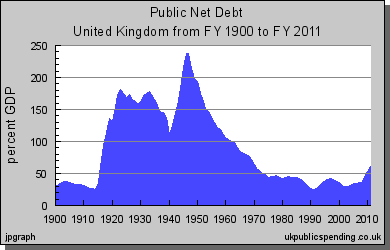
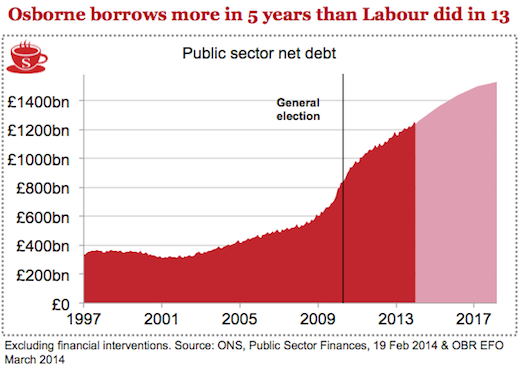
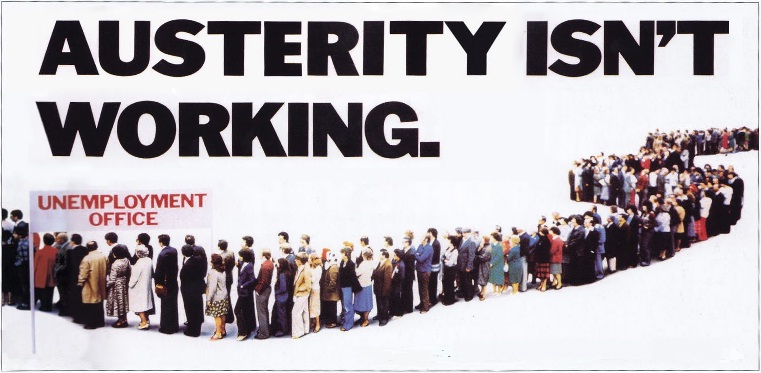
Thanks for sharing the post. My eyes have been opened. The time has come to stop austerity. The ordinary people are ready to fight back. No longer to succumb to the mistakes made by the rich. The poor no longer will bail the rich out. We are one of the richest countries in the world and we won’t be fooled by longer.
great post linking the myth behind the STPs ‘case for change’. and it’s more to do with the rich wishing to get richer off the backs of the ill and disabled. there is also a link to universal health credits and the STP ‘personal health budget’. It’s a disgrace!